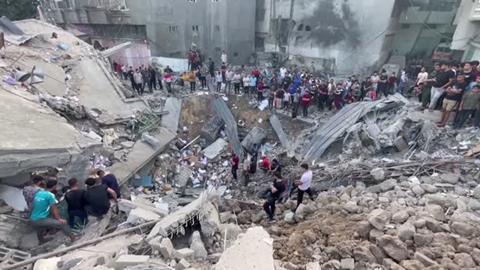The plight of persecuted Palestinian Christians is being forgotten, including among Christians in the West, argues Jack Nasser

In the heart of the Holy Land, where the roots of Christianity are intertwined with ancient landscapes, a stark contradiction demands attention.
Amid a tapestry of sacred sites that bear witness to the enduring faith of believers worldwide, Palestinian Christians grapple with a troubling reality. It is not just marginalisation that they face, but the relentless onslaught of systematic oppression.
The history of Christianity in this region is intricately woven into the fabric of ancient cities such as Bethlehem, Jerusalem, Hebron, Gaza and Nazareth. Proud descendants of Jesus Christ’s earliest followers, Palestinian Christians trace their roots back to the first century. Their contribution to shaping the early Christian faith echoes through millennia, a rich heritage extending from the time of Jesus all the way to the present day.
Despite this legacy, the Christian population, which has survived numerous conquests, colonisations and empires, has suffered a profound decline in recent years. In 1948, just before the creation of the state of Israel, Christians comprised around 10-20 per cent of the population of the Holy Land. Today, that number is just 1-2 per cent.
The history of Christianity in the region is a testament to resilient faith
Yet worldwide, between at least 1 in 10 Palestinians identify as Christian, with some estimates putting the number much higher at around 25 per cent. This data tells a disquieting story that demands global attention.
Persecuted
Concerns have been raised regarding the assaults on Palestinian Christians, with assertions that these form part of a systematic plan by the Israeli army, settlers, collaborators or, at times, extremist Muslims. The ongoing assault on Palestinian Christians intensifies the narrative of persecution, marked by documented cases of arson, vandalism, theft, confiscation and desecration. Christian sites, especially churches and properties, have endured relentless attacks, primarily concentrated in Jerusalem and the Galilee.
Clergy face persistent threats and violence, are often subjected to physical assaults, verbal abuse, spitting and intimidation. Palestinian Christian-owned homes, businesses and agricultural land bear the brunt of Israeli aggression, resulting in substantial material losses and instilling fear in local communities.
The ongoing war in Gaza has only made things worse. Christian-owned properties, including hospitals and churches, have borne the brunt of indiscriminate bombings, leading to displacement and the shattering of livelihoods. The disproportionate loss of life and injuries to Christian Palestinians in Gaza raises stark ethical questions. The silence of churches and the international community is deafening.
A hesitant response
Across the Holy Land, Christian responses have been disconcertingly hesitant, eclipsed by the aggressiveness of some evangelical groups, particularly those aligned with Zionism or influenced by apprehensions related to Islam. However, the stark reality calls for a more forceful and critical approach. Silence and neutrality are no longer sufficient in the face of such profound injustice.
The Christian population has survived numerous conquests, colonisations and empires
Complacency must be shed and our prophetic calling embraced. The teachings of Jesus demand that we rise above political agendas to fearlessly challenge oppression. Our faith cannot be confined to within the Church walls; it must make us courageous advocates for love, equality, peace and justice in the Holy Land.
The history of Christianity in the region is a testament to the resilience, faith and indomitable spirit of a community deeply rooted in its heritage. As we witness the challenges faced by the Palestinian Christian population, our response must transcend token prayers. Let us unite in fervent intercession, praying not only for the protection, strength, and resilience of all people in the Holy Land, but also for an end to the occupation and targeted assaults on churches and Christians there.
Let us stand in solidarity with Palestinian Christians and work towards a future where religious freedom, peace and justice prevail in the land that holds immense significance to millions around the world.



































No comments yet